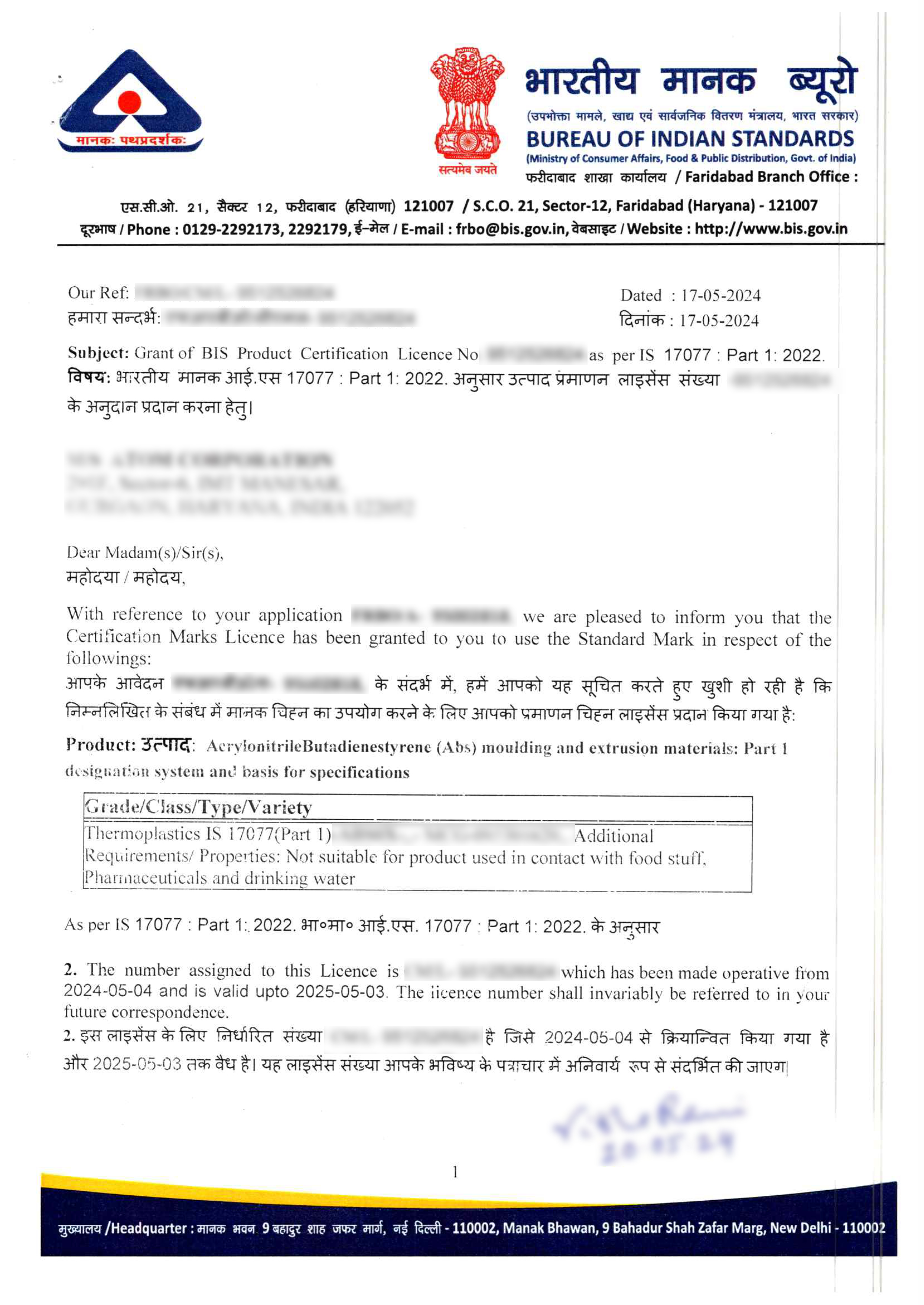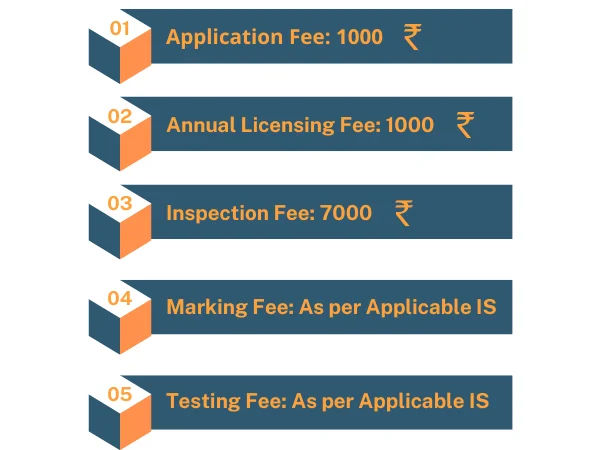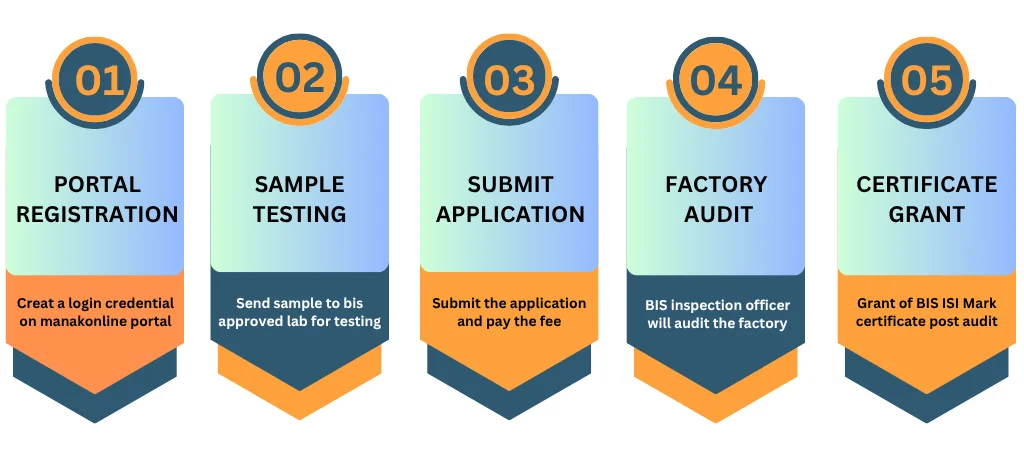
Get Instant Solution By an Expert Advisor
(4.8)
The ISI Mark, issued by BIS, ensures product quality and safety in India. Agile Regulatory provides complete support for ISI Mark certification, including application drafting, submission, product testing, equipment setup, on-site training, and audits. We help manufacturers and importers get certified smoothly and efficiently across all product categories.


10000 +
Projects Completed for Our Respected Clients.
15 +
Years Experienced Advisors in Indian Compliance.
98.9%
Project Delivery Ratio for Our Valuable Clients.
99.9%
Satisfied Customers All Over India.
The Indian Standard Institute, or ISI, is a certification received by the Bureau of Indian Standards that certifies items by stating that they meet stringent safety requirements and are safe to use by customers. In 1947, the Department of Industries and Supplies launched the ISI. The establishment of standards for Indian industries was the aim of the ISI Mark. ISI was taken over by the more powerful Bureau of Indian Standards in the middle of the 1980s.
A BIS Certificate program seeks to give customers a guarantee about the dependability, quality, and security of the products. In 1986, the BIS Act made ISI a statutory body. Since then, goods bearing the ISI mark have been regarded as meeting BIS requirements. A necessary ISI certification is needed for a number of product types, including chemicals, medical equipment, batteries, steel goods, and cement.
Then, the ISI was renamed BIS. This list includes over 350 goods for which a BIS certification is mandatory. Manufacturers and importers who want to register their products with BIS must carefully follow the guidelines set out by BIS, including filing, submitting applications, and testing items.
In 1987, the Bureau of Indian Standards replaced the Indian Standards Institute in short ISI. The ISI Mark is the official mark that the Bureau of Indian Standards grants to producers of a range of items. The ISI Mark has been recognized as a symbol of quality, safety, and dependability since 1955. The ISI mark has been used to industrial objects to denote conformity. It ensures that the product complies with the Indian standards or IS, which are developed by the main standard-setting body in the nation, the BIS.
ISI Mark Registration involves obtaining the ISI mark for any product that complies with Indian Standards. Among the numerous electrical appliances that need to have the ISI mark are electric irons, room heaters, air conditioners, stoves, freezers, electric cables, and other things, including UPVC pipes, rubber and leather shoes, composite cement, various acids, etc.
The authority to award ISI certifications or marks in India rests with the National Standard Body, often known as the Bureau of Indian Standards in short BIS. Additionally, the BIS inspector begins a preliminary inspection and verification of the production premises as soon as an application for the ISI Certificate is submitted. The same is done to make sure the product is safe to use and poses no health risks to the public in any way, in addition to complying with Indian Standards.

Benefits of ISI Mark certification are mentioned below:
|
Cement
|
Electrical goods
|
Batteries
|
|
Oil Pressure Stove
|
Automobile Part
|
Cylinder, Valves, Regulator
|
|
Medical Equipment
|
Steel and Iron Products
|
Electrical Transformer
|
|
Electrical Motor
|
Capacitors
|
Chemicals, Fertilizers
|
|
Polymers and Textiles
|
Kitchen Appliances
|
Water Heater
|
|
Air Conditioner and parts
|
Plugs and Sockets
|
LPG Gas Stove
|
|
Transparent Float Glass
|
Pressure Cooker
|
Cables & Wires
|
|
LPG Rubber Hose
|
Aluminium Foil
|
Non Electric Toys
|
|
Electric Toys
|
Transparent Glass
|
Safety Glass
|
|
Woven Sacks
|
Butterfly Valves
|
Reflector for Bicycle
|
|
Bicycle & Its Parts
|
Automobile Tyres
|
Paper
|
|
Automobile Wheel Rim
|
Footwear
|
Press Tools Punches
|
|
Helmets for Two-Wheeler
|
Refrigerator
|
Centrifugal Cast iron Pipes
|
|
Flux Cored Electrodes
|
Sewing Machine
|
Balloons
|
|
Water Treatment System
|
Jute Bag
|
Immersion Rod
|
The following list of required documents must be submitted to receive the ISI registration:

| Type of Fee | Amount in INR |
|---|---|
| Application Fee | 1000 |
| Annual Fee | 1000 |
| Inspection Fee | 7000 |
| Inspection Fee | As per applicable |
| Lab Testing Fee | As per applicable |
Process to apply for ISI Mark certification is mentioned below: 
The first and most important step is to choose a product quality that complies with the BIS's recommended standards. For their product, the applicant must determine and select an ISI (Indian Standard Institute) standard product code.
The applicant must apply for ISI certification after choosing the product and code. In order to do this, Form-V is submitted together with the required registration costs as an application for ISI certification. In addition, the applicant has to pay audit costs for a second examination on top of the registration expenses
Note: For every manufactured product, the applicant has to submit a different ISI form.
The applicant's factory premises will be visited by the BIS officer and the inspection team. Additionally, the applicant's factory's manufacturing process and quality control will be closely scrutinised by the inspection team. A BIS-approved laboratory will receive samples of the items that the BIS officer will gather and submit for testing.
The product sample report from the approved labs must be obtained by the applicant and submitted to BIS.
Following the application and verification procedure for the provided papers, test report, and application form (in Form-V), the ISI Mark Registration Certificate is issued by the BIS Authority. ISI Mark certification typically takes thirty days, beginning on the day the application is submitted.
In addition, the ISI certificate that has been granted has a one-year validity period and may be renewed after that. The applicant must submit an application that has been properly certified by a practising chartered accountant in order to have their certificate renewed.
The ISI Mark application can be rejected under the following circumstances:
The following are the purposes for getting an ISI mark certificate in India:
A number of strict minimum standards must be met by manufacturers in order to receive ISI Certification. These specifications form the cornerstone of an effective certification procedure and guarantee product quality, safety, and conformity with Indian Standards. It is quite important that you comprehend them before you start the process. For your thorough knowledge, below is a complete explanation to the requirements for ISI Certification.
Obtaining the ISI certification might be rather difficult because of the lengthy processes required. But it shouldn't be as complicated as it appears if you get the appropriate advice. Our experts at Agile Regulatory can easily assist you in obtaining the ISI certification due to their extensive expertise. Agile Regulatory is dedicated to assisting aspiring company owners by making it possible for them to secure the fundamental licenses and registrations needed to operate their enterprises.

Get Instant Solution By an Expert Advisor
(4.8)
The first license will be valid for one year. However, in case of renewal, an applicant can apply for min. 2 years and a maximum of five years.
The term ‘ISI’ stands for Indian Standards Institute. The purpose of ISI was to set guidelines for the efficient development of industries and the preservation of industrial production. It provides the ISI mark, an indicator of standards compliance for industrial goods in India.
ISI mark indicates that your product is safe to use. This is one of the most reputable certification marks in India.
The Indian government has set a quality criterion that ISI is intended to meet. Midway through the 1980s, the socioeconomic landscape shifted, and the Bureau of Indian Standards (BIS) was established as a more powerful organization. Later, the BIS took control of the ISI. Still, the ISI mark is a representation of quality products.
For the product to meet applicable Indian Standard Specification (ISS), the manufacturer must have the necessary production infrastructure, proper process controls, and testing and quality control capabilities. Also, the product must meet all specifications mentioned in the Indian Standards(IS).
Typically, the ISI certificate is obtained thirty days after the application is submitted.
You can apply for BIS certification, also known as the ISI mark, through Agile Regulatory. We offer comprehensive guidance and solutions to help you obtain the Bureau of Indian Standards Mark (ISI mark).
The BIS certification process involves these key steps:
To verify your BIS Certificate in India, follow these steps:
Proven 4-step Process: Consultation, Documentation, Submission, and Certification.
Startups to large enterprises, we deliver end-to-end solutions business compliance needs.

What our customer says about us
Fantastic support from the team. Their expertise transformed our approach, driving remarkable outcomes. A must-have partner for businesses seeking effective consulting solutions. Highly recommended.

Lavkush Sharma
KTPL Instruments
Agile Regualtory delivers exceptional solutions. Their insightful guidance streamlined our processes and boosted profitability. Highly recommended for businesses seeking expert consulting services to thrive.

Nitin Mukesh
Justrack IOT
Impressed by Agile Regulatory's expertise. Their strategic insights and practical solutions have elevated our business operations. A reliable partner for effective consulting services. Highly recommended for growth-focused businesses.

Pradeep Varma
Coaire Compressor
Extraordinary consulting services. Their insightful solutions and dedicated team reshaped our business, driving remarkable improvements. Highly recommend it for transformative results.

Bharat Bachwani
Easy Polymer
Incredible experience with Agile Regulatory. Their innovative strategies and expert advice revitalized our business model, resulting in impressive growth. Highly recommend their exceptional consulting services.

Atul Jain
Tarus International
Top-tier consulting! offered strategic solutions that revolutionized our approach. Their deep expertise and personalized guidance made a significant impact on our success. Highly recommend their services.

Paramjeet Singh
Anchor Weighing
Agile Regulatory exceeded expectations! Their tailored solutions, expertise, and proactive approach led to remarkable results. Highly recommend for businesses seeking impactful and strategic guidance.

Anshul Rathi
AM Capacitor
Outstanding service! delivered targeted solutions with professionalism and expertise. Their insights elevated our business strategies, resulting in noticeable growth. Highly recommended for exceptional consultation.

Shekhar Maurya
Imaxx Pro Aquistic